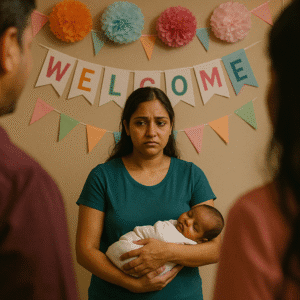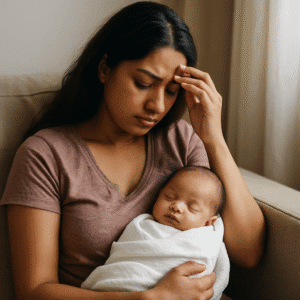“Post pregnancy depression? What do you mean?” she asked, her smile tugging at something hollow. “I’m so happy to have my baby… but I don’t know why it still feels like something’s missing.”
She had come in wearing a pink salwar and a brave face. She told me how everyone had said motherhood would be the happiest time of her life. That she would glow. That she would feel complete. But what no one had prepared her for were the long nights of crying without knowing why. Or the way her own reflection had started to feel like a stranger.
In that one moment, her eyes said everything. The exhaustion that ran deeper than just sleepless nights. The fear of being judged. And that quiet guilt she couldn’t even say out loud.
This isn’t an isolated story. In fact, a detailed study published in the Indian Journal of Psychiatry found that 22% of Indian women experience post pregnancy depression. The researchers pointed out that this number may be even higher in reality, as cultural stigma and lack of awareness often keep women from speaking up or seeking help. You can read more about this significant research in the Indian Journal of Psychiatry.
This article is for every woman who’s been there, or is quietly heading there. But it’s also for their husbands, their mothers-in-law, fathers, sisters, and friends.
Because while the rest of the house might be celebrating a new life with dhol and mithai, the new mom might be sobbing silently in the washroom, unsure why she feels so lost.
If you’re new to this conversation, I’ve also written a more detailed article on the clinical and emotional aspects of postpartum depression, it’s a good place to understand the bigger picture. Read it here.
Understanding post pregnancy depression isn’t just about offering sympathy.. It’s about being her soft place to land. Her mirror. Her support.
What is post pregnancy depression
Post pregnancy depression is more than just feeling overwhelmed after childbirth. It is a clinically recognised mental health disorder that can affect a woman’s ability to function and bond with her baby. Scientifically, it’s linked to the dramatic hormonal changes following delivery, specifically a sharp drop in estrogen and progesterone levels within 24 hours after childbirth. This hormonal crash can contribute to changes in brain chemistry that trigger mood disorders.

But the biology is only part of the picture. According to a study published in Lancet Global Health, up to 28% of women in low- and middle-income countries, including India, experience postpartum depression. These rates are often underreported due to stigma and lack of mental health infrastructure.
Further research by the National Institutes of Health confirms that sleep deprivation, poor social support, and a history of depression significantly raise the risk of post pregnancy depression.
In India, the situation is uniquely layered by cultural norms and expectations. A 2020 review in the Asian Journal of Psychiatry noted that shame, gender preference pressures, and lack of postpartum care contribute to emotional distress in Indian mothers.
Understanding these patterns helps dismantle myths. Post pregnancy depression is not a personal failure. It’s a medical condition, and like any condition, it needs care, not blame.
Learning to recognise it early is the first step toward healing. And yes, support can change everything.
5 Truths About Post Pregnancy Depression
Post pregnancy depression isn’t a sign of weakness or an isolated experience. It’s a reality for many women, and according to a 2022 report by UNICEF, the burden of maternal mental health conditions in India remains significantly under-addressed, affecting not just mothers but newborns as well. It deserves honesty, compassion, and support.
The American Psychological Association also emphasizes that untreated post pregnancy depression can lead to long-term developmental concerns for the child and chronic mental health issues for the mother. Learn more.
In this section, we’ll explore five deeply human truths about what post pregnancy depression really looks and feels like.
These truths come from years of listening to stories behind closed doors, observing patterns in therapy, and unlearning harmful narratives we’ve absorbed for generations. Understanding these can help every mom feel less alone, and every family member become part of the healing.
1. Post pregnancy depression doesn’t make you ungrateful
One of the most harmful myths around post pregnancy depression is that it reflects ingratitude. Many new moms hear, “But you have a healthy baby. Be happy!” But mental health doesn’t respond to logic or pressure. You can feel deep love for your child and still struggle with overwhelming sadness or anxiety.

Post pregnancy depression often sneaks in despite gratitude, not because of its absence. In therapy, I’ve heard clients say they felt ashamed for needing help when they “should” be grateful. The truth? Gratitude and depression can coexist. Recognising post pregnancy depression as a valid mental health condition helps remove this misplaced guilt.
2. It’s different from baby blues
Many confuse post pregnancy depression with baby blues, but they are not the same. Baby blues usually fade within 2 weeks. Post pregnancy depression lingers and deepens, often requiring professional intervention.
| Feature | Baby Blues | Post Pregnancy Depression |
|---|---|---|
| Duration | Up to 2 weeks | Over 2 weeks, can last months |
| Symptoms | Tearfulness, irritability | Hopelessness, worthlessness |
| Impact | Mild, manageable | Severe, interferes with daily life |
| Requires treatment? | Rarely | Often necessary |
Post pregnancy depression deserves recognition and support. Knowing the difference can change the way we respond to struggling mothers.
3. It affects identity and self-worth
Post pregnancy depression doesn’t just impact mood – it shakes up a woman’s entire sense of self. New mothers may feel like they’ve lost the person they were before childbirth. They question their abilities, their value, even their decision to become a parent.
One client told me, “I don’t know who I am anymore. I’m someone’s mom, someone’s wife… but what about me?” This crisis of identity is one of the less spoken-about aspects of post pregnancy depression.
It’s essential to talk about how post pregnancy depression influences self-image and self-worth. Therapy helps by holding space for women to grieve who they were and slowly discover who they are becoming.
4. It impacts physical health too
While post pregnancy depression is primarily psychological, it shows up in the body too. Appetite changes, sleep issues, headaches, fatigue, and even chronic pain can accompany emotional distress.
Studies show that women with post pregnancy depression often report more somatic symptoms compared to those without. Here’s a quick look:
| Symptom Type | Example |
| Sleep disruptions | Insomnia, oversleeping |
| Appetite changes | Loss of appetite, overeating |
| Physical pain | Headaches, backaches |
Understanding these physical cues can help family members spot what a new mom may not be able to express.
5. Recovery is possible, but it looks different for everyone
There’s no one-size-fits-all path to healing from post pregnancy depression. Some women feel better after a few therapy sessions. Others may need medication, support groups, or months of consistent self-care.
Recovery is not linear. It may involve setbacks. What matters is not perfection but progress, choosing to seek help and keep going. As I often tell my clients, healing is not about being who you were before. It’s about learning to be kind to the person you are becoming.
Each woman’s journey with post pregnancy depression is unique. The key is to not walk it alone. If you are struggling with long-term depression, this article may help you understand it better. Read more here.
How Culture Shapes Post Pregnancy Depression
Post pregnancy depression in India doesn’t exist in a vacuum, it’s tangled in rituals, expectations, and silence. Unlike many Western contexts where mental health is openly discussed, Indian mothers often experience an added layer of pressure to conform, smile, and suppress their emotional struggles in the name of tradition.
Take the example of the 40-day confinement period. While originally designed for rest, it often ends up isolating the new mom, placing her in a room away from visitors and the outside world. For a woman already experiencing emotional lows, this isolation can deepen feelings of loneliness and inadequacy.
Then there’s the pressure of performing joy. Even if she feels anxious, disconnected, or numb, she’s expected to glow, be grateful, and adapt instantly to motherhood. Comments like “sab theek ho jayega” or “yeh toh har maa ke saath hota hai” invalidate her pain and prevent her from speaking up.
Recognising how cultural practices influence post pregnancy depression is essential. Families must learn to separate tradition from emotional neglect. Rituals can heal, but only when they make space for real emotions.
Breaking this cycle begins with honest conversations and gentle questions like, “How are you feeling today?” Because every new mother deserves to be seen, not just celebrated.
Common Myths About Post Pregnancy Depression
There’s still so much misinformation around post pregnancy depression, and that misinformation can make new moms feel even more isolated. Let’s clear up some of the most common myths so that you, or someone you love, isn’t left second-guessing what’s real.
- Myth 1: Post pregnancy depression is just hormones. While hormones crash dramatically after childbirth, post pregnancy depression is also shaped by emotional strain, identity changes, sleep deprivation, and societal pressures. Reducing it to ‘just hormones’ is not only inaccurate but also prevents timely intervention and support that could genuinely help the mother recover.
- Myth 2: It happens only to weak or ungrateful mothers. Post pregnancy depression does not discriminate. It affects women across backgrounds, including successful professionals, joyful homemakers, first-time moms, and even those with strong support systems. Strength and gratitude are not antidotes. This myth creates unnecessary shame and delays healing.
- Myth 3: You’ll hurt your baby if you talk about it. Suppressing mental health struggles increases the risk of long-term emotional impact for both the mother and baby. Talking about post pregnancy depression and seeking help allows mothers to show up more fully for their children, and for themselves.
- Myth 4: If you didn’t have depression before, you’re safe. Many women develop post pregnancy depression despite never having a prior mental health diagnosis. The triggers are often situational, hormonal, and biological, not just historical. Lack of a mental health past doesn’t guarantee immunity.
- Myth 5: Medication is the only solution. While medication can be life-changing for some, it’s not the only route. Therapy, peer support, mindfulness, and lifestyle changes are powerful tools in the recovery process. What works varies from woman to woman, and healing is rarely one-size-fits-all.
Understanding these myths is a step toward a more compassionate and informed support system.
Help Her Get Out of Post Pregnancy Depression
Supporting someone with post pregnancy depression requires more than just good intentions. It calls for awareness, patience, and real empathy. Family members play a key role in a new mother’s emotional recovery, especially in Indian households where the postpartum period is often steeped in tradition but not always in emotional support.
First, listen without judgement. Let her speak freely about her feelings without interrupting or offering immediate solutions. Just being present matters.
Second, encourage rest. Sleep deprivation fuels post pregnancy depression. Step in to help with baby duties or coordinate with other family members to share the load.
Third, gently nudge her toward professional help. Offer to find a therapist or even attend the first session with her if needed. Therapy for new moms can be life-changing.
Lastly, drop the pressure to be the “perfect mom.” Celebrate her small wins. Check in on her, not just the baby. Post pregnancy depression is temporary, but love and support make the biggest difference in her healing.
Understanding the signs of post pregnancy depression empowers the entire family to support her recovery, not dismiss it as moodiness or weakness
You’re Still You
A month after her baby arrived, one of my clients celebrated her birthday. Her friends showed up with balloons, a cake, and a big cheerful banner that read, ‘Happy Birthday, New Mom!’
Later that evening, she sat across from me and whispered, “I know they meant well, but I felt like crying. Why did they call me that? It’s like I’ve been renamed. Like I’m no longer me, just a new mom.”

Her story stayed with me. Because post pregnancy depression often begins not just with hormones, but with a quiet identity theft, where the woman you were slowly fades under feeding schedules and advice from everyone but herself.
But here’s what I remind my clients: you are still you. Even when it feels blurry. Even when the world forgets to see you beyond the baby.
Healing from post pregnancy depression is not about returning to who you were, it’s about remembering that your story matters too.
If you found this helpful, don’t miss other powerful reflections on emotional and mental health in our Body & Balance segment. And if you are a new mom, you can also explore our Bump & Beyond segment, where Dr. Sonia shares articles about pregnancy and women’s health.
Disclaimer: This article is intended for informational purposes only. It is not a substitute for mental health advice, diagnosis, or treatment. Every woman’s emotional journey is unique, and it’s important to consult with a qualified mental health professional for personalised support.
Frequently Asked Questions
1. How common is post pregnancy depression in India?
Studies suggest post pregnancy depression affects about 22% of Indian mothers, though the actual number may be higher due to underreporting. Cultural stigma and lack of awareness often prevent many women from seeking help for post pregnancy depression.
2. Can post pregnancy depression start months after delivery?
Yes, post pregnancy depression can begin anytime within the first year after childbirth. Some women experience it immediately, while others may not notice symptoms until months later, as they navigate sleep deprivation and emotional stress.
3. How is post pregnancy depression different from postpartum blues?
Post pregnancy depression is more severe and long-lasting than postpartum blues. Baby blues fade within two weeks. Postpartum depression persists, affecting mood, energy, and bonding.
4. Is therapy effective for post pregnancy depression?
Yes. Therapy for post pregnancy depression provides emotional support, coping tools, and a safe space to process identity shifts and grief. It’s often recommended as a first step before considering medication.
5. Do only first-time mothers experience post pregnancy depression?
No. Post pregnancy depression can affect any mother, regardless of whether it’s her first or fourth child. Emotional and hormonal responses vary widely from one pregnancy to another.
6. Can post pregnancy depression affect bonding with the baby?
Yes. Post pregnancy depression may cause feelings of detachment, guilt, or numbness. This can impact bonding, but with support and treatment, the relationship can heal and grow strong.
7. Are medications safe during post pregnancy depression?
Many antidepressants are safe to use while breastfeeding, but it’s essential to consult a psychiatrist. Medication can be helpful for moderate to severe post pregnancy depression when paired with therapy.
8. Can dads or partners help with post pregnancy depression?
Absolutely. Supportive partners can make a huge difference in recovery from post pregnancy depression. Listening without judgment and encouraging help-seeking behavior are two powerful acts of care.
9. Is post pregnancy depression preventable?
While not entirely preventable, risk can be reduced with prenatal education, strong support systems, adequate sleep, and early intervention if symptoms appear. Awareness is key to managing post pregnancy depression.
10. How long does post pregnancy depression last?
Without help, it may linger for months or longer. With proper treatment, many women start to feel better within weeks. The duration varies, but post pregnancy depression is treatable and temporary.

Rina Goswamy is a psychotherapist with 11 years of experience helping women from all walks of life navigate emotional challenges, relationships, and self-discovery. Known for her bubbly warmth and no-nonsense insight, Rina believes therapy doesn’t have to feel heavy — sometimes, all it takes is asking the right question at the right time. Her writing feels like a conversation with a wise friend who just gets it.



